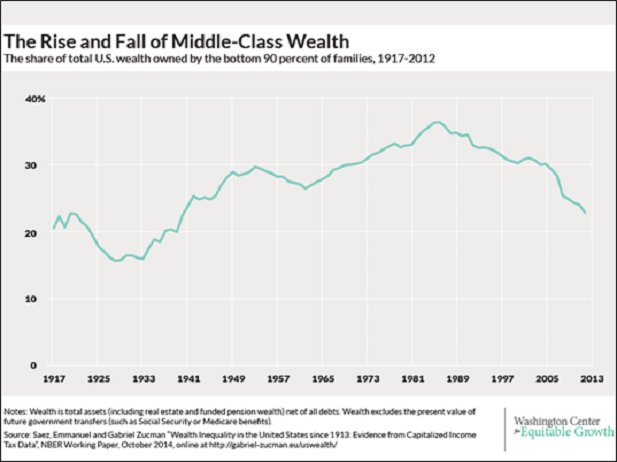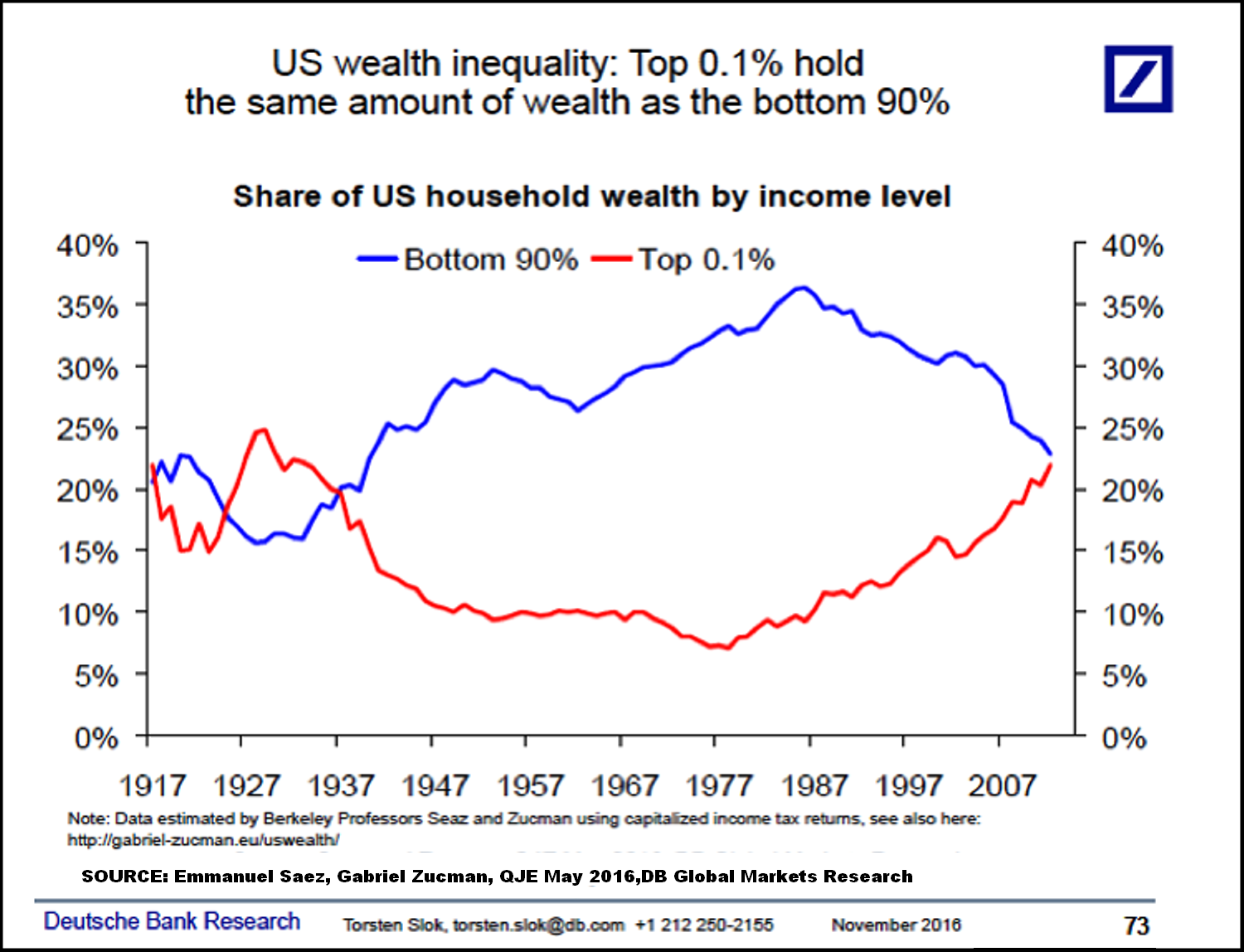The rise and fall of US middle-class wealth
Leave a comment Cancel reply
This site uses Akismet to reduce spam. Learn how your comment data is processed.
Real-World Economics Review
WEA Books

follow this blog on Twitter
Top Posts- last 48 hours
- DSGE models — a total waste of time
- Lost opportunities?
- USA: The Great Prosperity / The Great Regression : 5 charts
- Weekend read - A STIGLITZ ERROR?
- The problem with electric vehicles
- Comments on RWER issue no 80
- Comments on RWER issue no. 91
- Graph of the week: GINI index for 17 countries since WWII
- Reflections on the “Inside Job”
- Macro-economic policy and votes in the thirties: Germany (and The Netherlands) during the Great Depression
"We cannot solve our problems with the same thinking we used when we created them." Albert Einstein
Regular Contributors
Real World Economics Review
The RWER is a free open-access journal, but with access to the current issue restricted to its 25,952 subscribers (07/12/16). Subscriptions are free. Over one million full-text copies of RWER papers are downloaded per year.
WEA online conference: Trade Wars after Coronavirus
Comments on recent RWER issues
————– WEA Paperbacks ————– ———– available at low prices ———– ————- on most Amazons ————-
WEA Periodicals
----- World Economics Association ----- founded 2011 – today 13,800 members
Recent Comments
- George H. Blackford on DSGE models — a total waste of time
- ghholtham on Lost opportunities?
- ghholtham on DSGE models — a total waste of time
- ghholtham on DSGE models — a total waste of time
- David Harold Chester on DSGE models — a total waste of time
- David Harold Chester on Lost opportunities?
- Taco Bottema on Lost opportunities?
- George H. Blackford on DSGE models — a total waste of time
- Stuart.Mac McBurney on Lost opportunities?
- ghholtham on Weekend read – A STIGLITZ ERROR?
- David Harold Chester on Weekend read – A STIGLITZ ERROR?
- David Harold Chester on Weekend read – A STIGLITZ ERROR?
- sackergeoff on With a modest financial transactions tax, Jim Simons would not have been superrich
- CBASILOVECCHIO on Weekend read – A STIGLITZ ERROR?
- David Harold Chester on Weekend read – A STIGLITZ ERROR?
Comments on issue 74 - repaired
Comments on RWER issues
WEA Online Conferences
—- More WEA Paperbacks —-
———— Armando Ochangco ———-

Shimshon Bichler / Jonathan Nitzan

————— Herman Daly —————-

————— Asad Zaman —————

—————– C. T. Kurien —————

————— Robert Locke —————-

Guidelines for Comments
• This blog is renowned for its high level of comment discussion. These guidelines exist to further that reputation.
• Engage with the arguments of the post and of your fellow discussants.
• Try not to flood discussion threads with only your comments.
• Do not post slight variations of the same comment under multiple posts.
• Show your fellow discussants the same courtesy you would if you were sitting around a table with them.
Most downloaded RWER papers
- Trade and inequality: The role of economists (Dean Baker)
- Why some countries are poor and some rich: a non-Eurocentric view (Deniz Kellecioglu)
- Debunking the theory of the firm—a chronology (Steve Keen and Russell Standish)
- Global finance in crisis (Jacques Sapir)
- The state of China’s economy 2009 (James Angresano)
- What Is Neoclassical Economics? (Christian Arnsperger and Yanis Varoufakis)
- Green capitalism: the god that failed (Richard Smith)
- The housing bubble and the financial crisis (Dean Baker)
- New thinking on poverty (Paul Shaffer)
Family Links
Contact
follow this blog on Twitter
RWER Board of Editors
Nicola Acocella (Italy, University of Rome) Robert Costanza (USA, Portland State University) Wolfgang Drechsler ( Estonia, Tallinn University of Technology) Kevin Gallagher (USA, Boston University) Jo Marie Griesgraber (USA, New Rules for Global Finance Coalition) Bernard Guerrien (France, Université Paris 1 Panthéon-Sorbonne) Michael Hudson (USA, University of Missouri at Kansas City) Frederic S. Lee (USA, University of Missouri at Kansas City) Anne Mayhew (USA, University of Tennessee) Gustavo Marqués (Argentina, Universidad de Buenos Aires) Julie A. Nelson (USA, University of Massachusetts, Boston) Paul Ormerod (UK, Volterra Consulting) Richard Parker (USA, Harvard University) Ann Pettifor (UK, Policy Research in Macroeconomics) Alicia Puyana (Mexico, Latin American School of Social Sciences) Jacques Sapir (France, École des hautes études en sciences socials) Peter Söderbaum (Sweden, School of Sustainable Development of Society and Technology) Peter Radford (USA, The Radford Free Press) David Ruccio (USA, Notre Dame University) Immanuel Wallerstein (USA, Yale University)



























A universal dividend is the expression of economic democracy and a 50% discount/rebate policy implemented at the point of sale throughout the entire economic/productive process including retail sale which is the terminal expression point for any and all forms of inflatio and so linearizes painless and beneficial price deflation. The rebate makes everyone whole on their overheads and profit margins and doubles everyone’s potential purchasing power. You want the return of a healthy middle class….consider it.
Just sayin’….
The working class was erased by Clinton decades ago. He redesigned the concept as “working people”. This has served as a large category to encase anyone who is poor enough to be grateful for survival. A healthy middle class needs basic health and safety measures in place to start with! Given the degree of man-made disasters, deceases, floods and fires that we face, ideas of stagflation, hyperinflation, economic management of money, markets, and even the almighty money markets have become redundant. A UNIVERSAL understanding of the key issues at stake for the whole of humanity is the first step to take, as is a new school of theory and practice as suggested a few seconds ago.
Considering what we know about the effects of the national and state-level policies put in place over the period of the graphs, it is difficult not to conclude that the policies intended the effects seen the graphs. Few of the changes in wealth or wealth distribution in the graph were accidental. These policies are zero-sum. Some are made rich as others are made poor. This is more than just an unequal wealth strategy. It is also an effective and brutal way to control most of the population of the nation. It’s difficult to be politically active or oppose one’s enslavement when on a day-to-day basis it’s difficult or impossible to obtain the basics needed for subsistence.